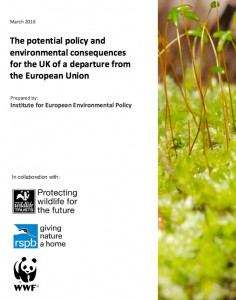An important new report has appeared today, to contribute to the debate about whether the UK should stay in or leave the European Union.
Commissioned by RSPB, The Wildlife Trusts and WWF UK, the report was prepared by the Institute for European Environmental Policy (IEEP). The report investigates the EU policies which have a significant impact on nature and the broader environment in the UK, assesses them for their effectiveness, strengths and weaknesses, and considers what might happen were the UK to leave the EU. In order to make this assessment, two scenarios are explored, one involving the UK leaving the EU but remaining in the European Economic Area, the other involving a total exit. Depending on which path is taken, the impacts on the environment are very different. In many ways, this sums up the broader debate around Brexit – there are so many variables, that it’s very difficult to see what the ultimate consequences of leaving the EU would be, on the environment, as much as anything else.
What is clear from the report is that were the UK to stay in the EEA, some of the environmental protections that currently exist would be maintained, because in order for the UK to export products to the EU, they would have to have been produced within the same framework of rules that apply to other members of the EEA, most of whom are within the EU. This is something that the various Brexiteer groups have not really explained to the public – which of the options on the table they are intending to take.
These are the main conclusions from the report are:
- Membership of the EU has had, and continues to have, a significant positive impact on environmental outcomes in the UK as well as other parts of Europe, with cleaner air, waterand oceans than otherwise could be expected.
- This is because of a range of legislative, funding and other measures with the potential to work in combination. EU environmental legislation is backed up by a hard legal implementation requirement of a kind that is rarely present in international agreements on the environment; and which is more convincingly long lasting, and less subject to policy risk, than national legislation.
- Complete departure from the EU (Brexit Scenario 2) would create identifiable and substantial risks to future UK environmental ambition and outcomes. It would exclude the UK from decision making on EU law and there would be a risk that environmental standards could be lowered to seek competitive advantage outside the EU trading bloc.
- Departure from the EU whilst retaining membership of the EEA (Brexit Scenario 1) would lessen these risks, as most EU environmental law would continue to apply. However, there would be significant concerns related to nature conservation and bathing water, as well as to agriculture and fisheries policy. In addition, the UK would lose most of its influence on EU environment and climate policies.
- Under both exit scenarios, significant tensions would be created in relation to areas of policymaking where responsibility is devolved to the governments in Scotland, Wales, and Northern Ireland, but where a broadly similar approach has been required as a result of EU membership, including environmental protection, agriculture, and fisheries.
- The uncertainty and period of prolonged negotiation on many fronts caused by a UK decision to leave would, itself, create significant risks both for environmental standards and for the green investment needed to improve the UK’s long term environmental performance.
The broad headline is
The sponsors of the report, RSPB, the Wilfdlife Trusts and WWF, have come in for some criticism from Brexit supporters, and the Charity Commission has brought out new guidance, which has already been seriously criticised, on how Charities should consider whether to campaign for one side or the other. This guidance has come, hot on the heels, of a Government announcement to prevent Charities from lobbying, where they receive public funding.
The strength and depth of evidence in this report will bolster those organisations who are campaigning for the UK to stay in the EU, in a debate which has been marked, thus far, by the lack of much if any considered analysis on either side of the debate. RSPB Conservation Director Martin Harper has written about their view this morning and I am sure RSPB will have given the matter very careful thought before deciding whether to adopt a neutral stance on the EU debate or to campaign for one side or the other.
People Need Nature does not have a formal position on the EU referendum, but we will continue to seek out and publicise evidence about the potential impact of Brexit to help people who care about nature to make up their minds.


Comments are closed.